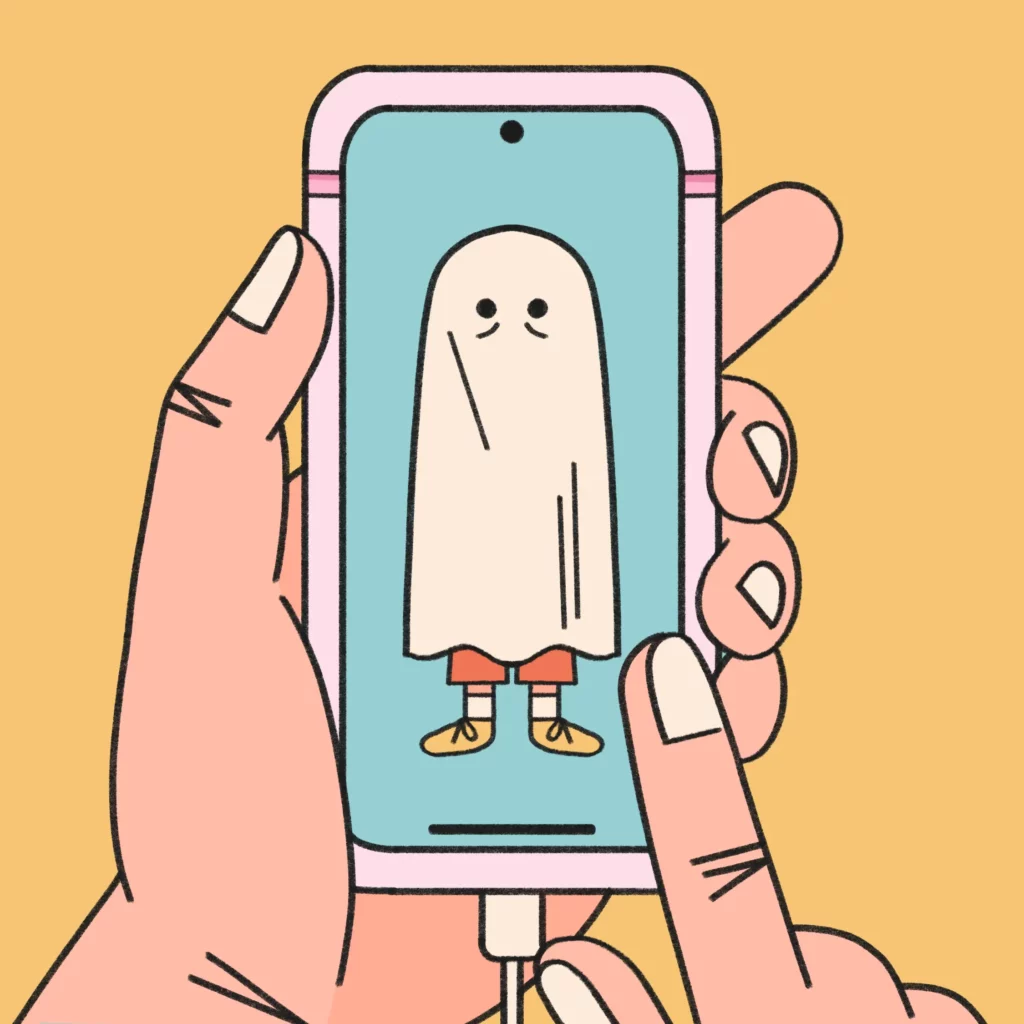From unanswered voicemails to text messages being left on read, ghosting has become all too common in modern communication.
Whether it’s professionally, personally, or romantically, ghosting is now a familiar way to end communication with someone without any explanation.
But just how prevalent is ghosting in America, and which cities have the highest rates of ghosting?
NumberBarn, a phone number management company and marketplace, surveyed more than 1,500 residents of the 30 largest metropolitan areas in the U.S. and asked them about their experiences with ghosting — including how often they’ve ghosted others and how often they’ve been ghosted.
Key Findings
- Cities with the highest rates of ghosting include Washington, D.C., Tampa, San Francisco, Austin, and Las Vegas.
- The most common reasons for ghosting someone include conflict avoidance (50%), toxic behavior (21%), and lack of mutual effort in the relationship (8%).
- Only one-quarter have reconciled with someone who ghosted them and resumed their relationship.
- Gen Z is the most likely generation to ghost a potential employer during the hiring or interview process.
Ghosting Across the Nation: Cities With the Highest Ghosting Rates
Ghosting isn’t just a modern-day phenomenon — it’s a nationwide trend.
According to our survey, the cities with the highest rates of ghosting are led by Washington, D.C., where a staggering 76% of respondents admitted to ghosting someone within the last 12 months. Following closely behind are Tampa (72.9%), San Francisco (68.1%), Austin (63.3%), and Las Vegas (60.0%).
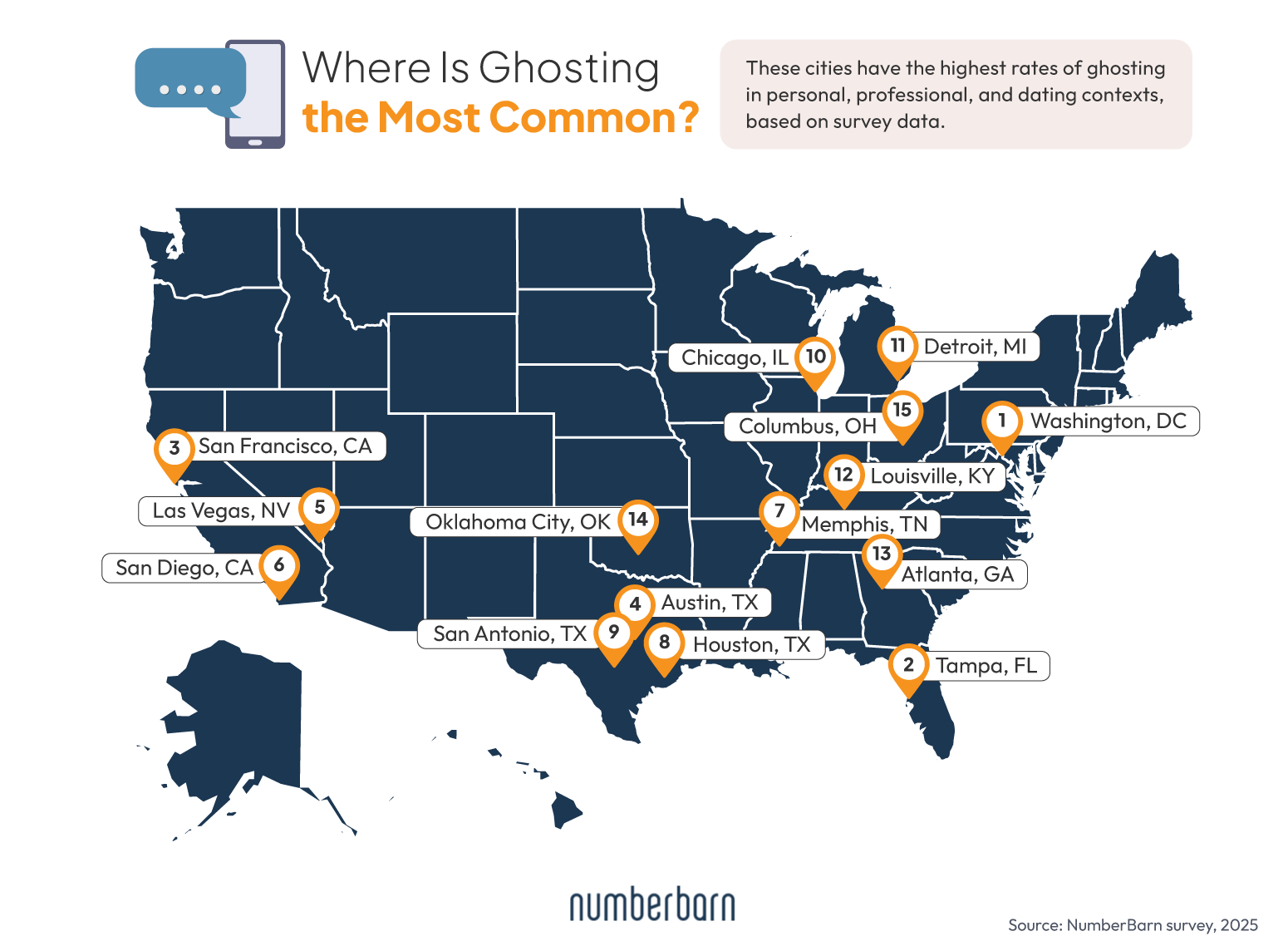
- Washington D.C.
- Tampa, FL
- San Francisco, CA
- Austin, TX
- Las Vegas, NV
- San Diego, CA
- Memphis, TN
- Houston, TX
- San Antonio, TX
- Chicago, IL
- Detroit, MI
- Louisville, KY
- Oklahoma City, OK
- Atlanta, GA
- Columbus, OH
Along with Austin, two other Texas cities ranked within the top 10: Houston (56.3%) and San Antonio (56.3%). These findings highlight ghosting as a behavior that transcends coastlines and cultural hubs.
Why does D.C. top the charts? Residents of the nation’s capital not only report the highest prevalence of ghosting but also the highest frequency. On average, D.C. respondents say they’ve ghosted 5.1 people within the last year — more than any other city in our analysis. And it’s not just one-sided. D.C. residents also report being ghosted an average of 3.4 times in the same timeframe, making it not only the political capital of America, but also the nation’s ghosting capital.
Ghosting Statistics: How Common is Ghosting?
Have you ever been ghosted by someone you know? If so, you’re not alone.
A majority of respondents (65%) say they’ve been ghosted in a personal, professional, or dating context at least once in the past 12 months. On average, respondents report being ghosted three times within that same time frame.
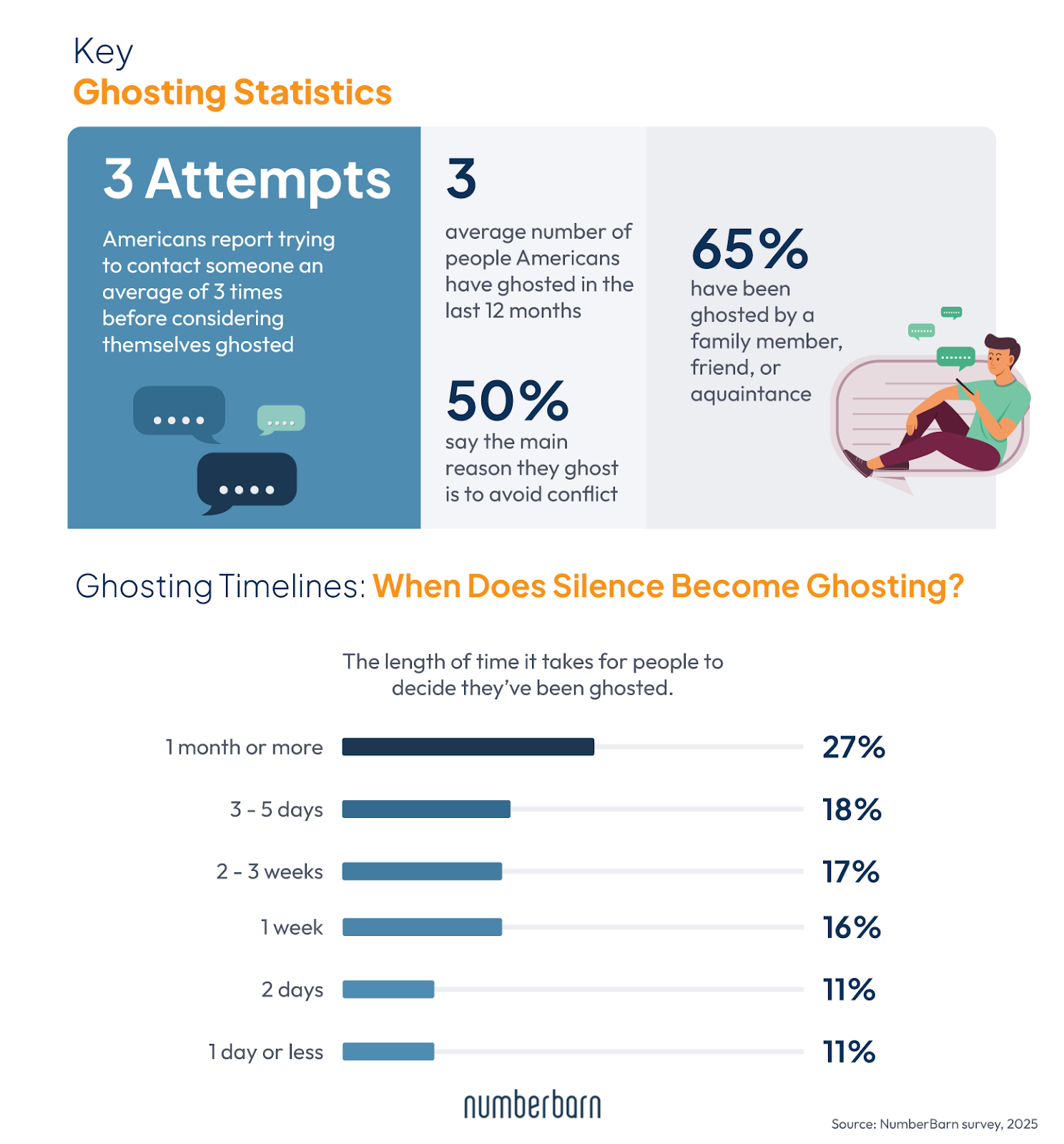
How Long Is Too Long? When People Consider Themselves Ghosted
For most, it takes about three unanswered attempts to reach out before they decide they’ve been ghosted. Respondents cite the most common reasons for ghosting someone as conflict avoidance (50%), toxic behavior (21%), and a lack of mutual effort in the relationship (8%).
When it comes to timing, over one in four (27%) say they wait about a month without any contact before labeling the situation as ghosting.
How Common Is Ghosting in Dating?
Ghosting has become a pervasive part of modern dating, with 75% of singles admitting they’ve been ghosted by someone they were dating or chatting with on a dating app, according to survey respondents. While enduring the silent treatment is common, fewer people admit to dishing it out — only 50% say they’ve ghosted someone themselves.
Interestingly, men report being ghosted slightly more often than women, with 77% of single males saying they’ve experienced it, compared to 72% of females. When it comes to admitting they’ve ghosted someone in a dating context, 46% of males and 55% of females say they have ghosted someone they were dating or chatting with on a dating app.
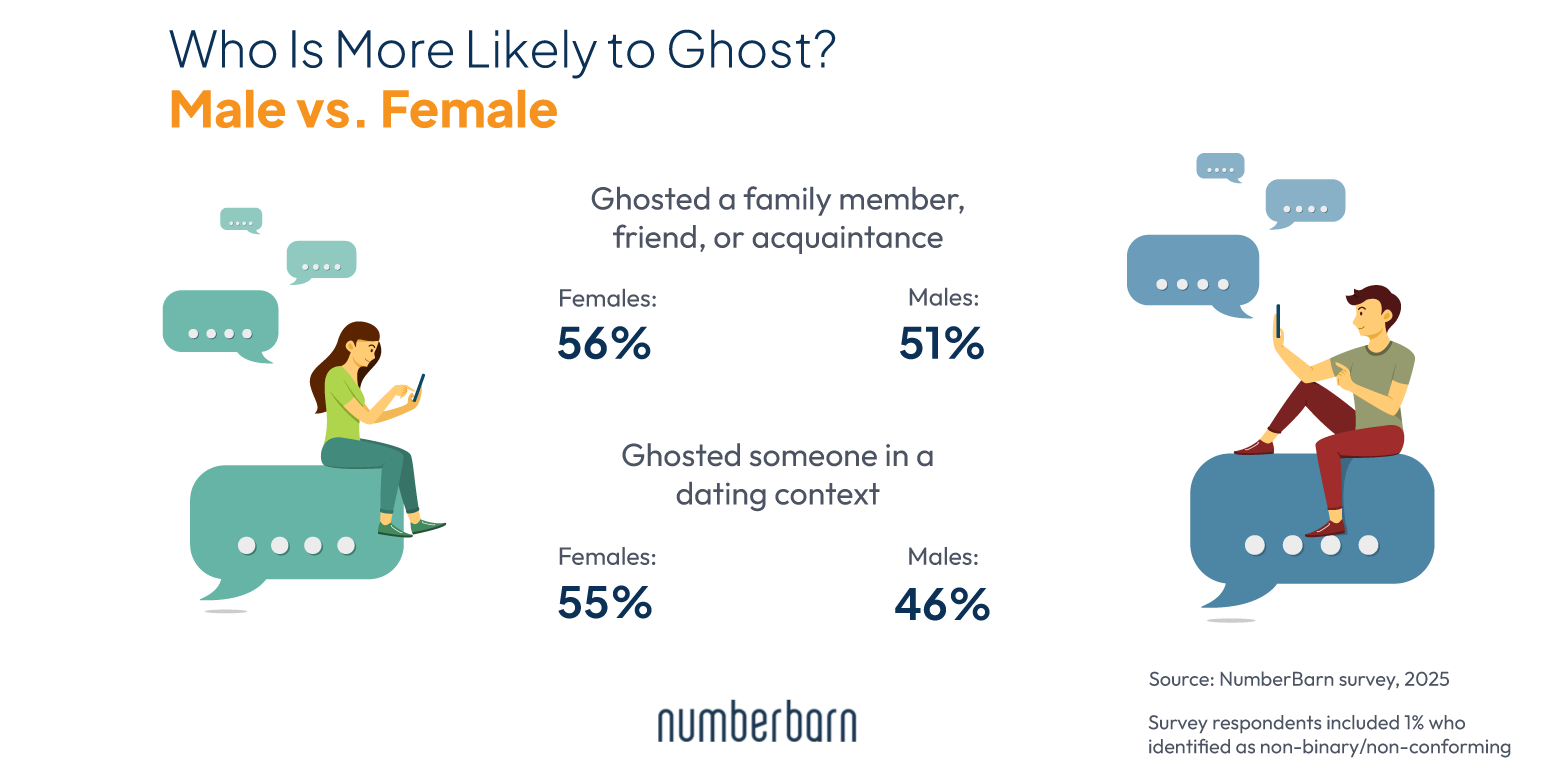
Why Do People Ghost When Dating?
When it comes to reasons for ghosting within a dating context, the majority of respondents (54%) say they disappeared because they lost interest. Another 28% cite “red flags or dealbreakers” as the driving force behind their decision, such as dishonesty, rude behavior, or incompatibility. Meanwhile, 9% say personal circumstances — like feeling overwhelmed by life events or stress — prompted them to cut ties without explanation.
Generational Ghosting: Who’s Doing It the Most?
Younger generations are more likely to admit to ghosting in dating contexts. Gen Z leads the pack, with 52% saying they’ve ghosted someone, followed closely by Millennials at 52%. Gen X isn’t far behind at 49%, while Boomers are the least likely to ghost, with 30% acknowledging they’ve done it.
These generational trends point to a shifting landscape in how people navigate romantic relationships. For younger generations, ghosting may feel like an easier, less confrontational way to end a connection, while older generations may prioritize more direct communication.
Workplace Ghosting: A Growing Trend in Hiring
The professional world is no stranger to ghosting. In fact, more than half (61%) of survey respondents say they’ve been ghosted by a potential employer during the hiring process.
Whether it’s a lack of follow-up after an application, a no-show to a scheduled interview, or silence after a verbal job offer, employer ghosting has become a frustratingly common experience for job seekers.
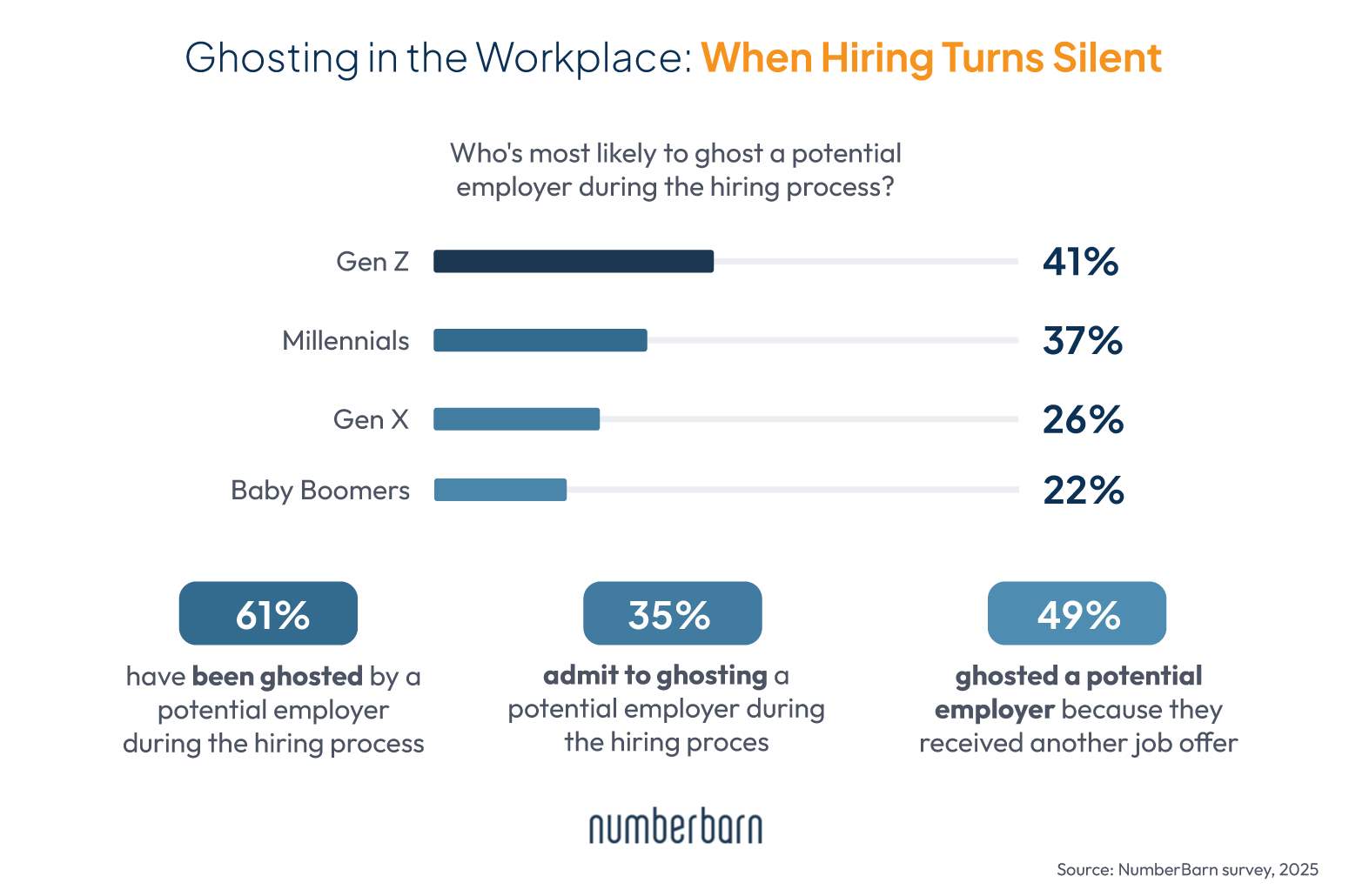
Why Job Candidates Ghost Employers
But professional ghosting is not a one-sided issue. Job candidates are ghosting, too, with more than one-third (35%) admitting they’ve ghosted a potential employer. The reasons? Nearly half (49%) say they abruptly ended communication after receiving another job offer, while 28% lost interest in the role altogether, which highlights the importance of clear communication during the hiring process.
When it comes to ghosting employers, younger generations are leading the charge. Gen Z tops the list, with 41% admitting to ghosting a potential employer, followed closely by Millennials at 37%. Gen X trails behind at 26%, and Boomers are the least likely to ghost during the hiring process, with only 22% admitting to doing so.
These generational differences suggest a shift in workplace expectations and communication styles. Younger job seekers, often navigating competitive job markets, may feel more empowered to prioritize better offers or ignore roles that don’t meet their needs. Meanwhile, older generations, raised with more traditional workplace norms, may approach hiring with greater patience.
Can Ghosted Relationships Be Repaired?
Whether it’s in the workplace, the dating scene, or between friends and family, clear communication is key to building and maintaining meaningful relationships. Yet, as our survey reveals, ghosting has become a widespread issue in modern communication.
For many, ghosting leaves little room for reconciliation. In fact, 44% of respondents say they’ve never reconciled with someone who ghosted them. Only one-quarter managed to reconcile and resume their relationship, while 30% say their attempts to reconcile didn’t last. These figures highlight the importance of addressing communication breakdowns early to avoid strained or broken relationships.
Tips on How to Avoid or Address Ghosting
There are steps you can take to reduce ghosting in your personal and professional life and practice better communication:
Set Expectations Early
Whether you’re in the hiring process, starting a new relationship, or reconnecting with a friend, being upfront about your communication style and expectations can help minimize misunderstandings.
Follow Up Thoughtfully
If someone hasn’t responded, give them a reasonable amount of time before reaching out again. Three follow-ups without a response is generally a good rule of thumb.
Practice Empathy
Ghosting can sometimes be unintentional. Consider sending a message to check in before assuming the worst.
Embrace Direct Communication
Avoid ghosting others by practicing honesty, even when it’s uncomfortable. A kind but straightforward message can go a long way.
Stay Connected with the Right Tools
Platforms like NumberBarn can help you manage your communication effectively, whether it’s keeping a professional number for work contacts or separating personal from professional conversations.
Ghosting may be a sign of the times, but with a little effort, it’s possible to build stronger, more transparent communication in your life.
Methodology
In January 2025, we surveyed 1,510 American residents of the 30 largest metropolitan areas in the country. Survey respondents were asked about the prevalence and frequency of ghosting in their personal, professional, and dating lives, if applicable. We used the prevalence of ghosting within the last 12 months in order to rank each city. To maintain accuracy, we identified and excluded outliers using the Interquartile Range (IQR) method, ensuring that extreme responses did not skew the averages.
Demographics
The survey respondents included 54% females, 45% males, and 1% identifying as non-binary/non-conforming. The average age of the respondents was 38 years. Limitations: The survey responses rely on self-reporting, which may be subject to recall bias or social desirability bias.
Sources
U.S. Census Bureau American Community Survey, Pew Research Center
Fair Use
When using this data and research, please attribute by linking to this study and citing https://www.numberbarn.com.
Media Inquiries
For media inquiries, contact media@numberbarn.com
Illustrations by Shideh Ghandeharizadeh

